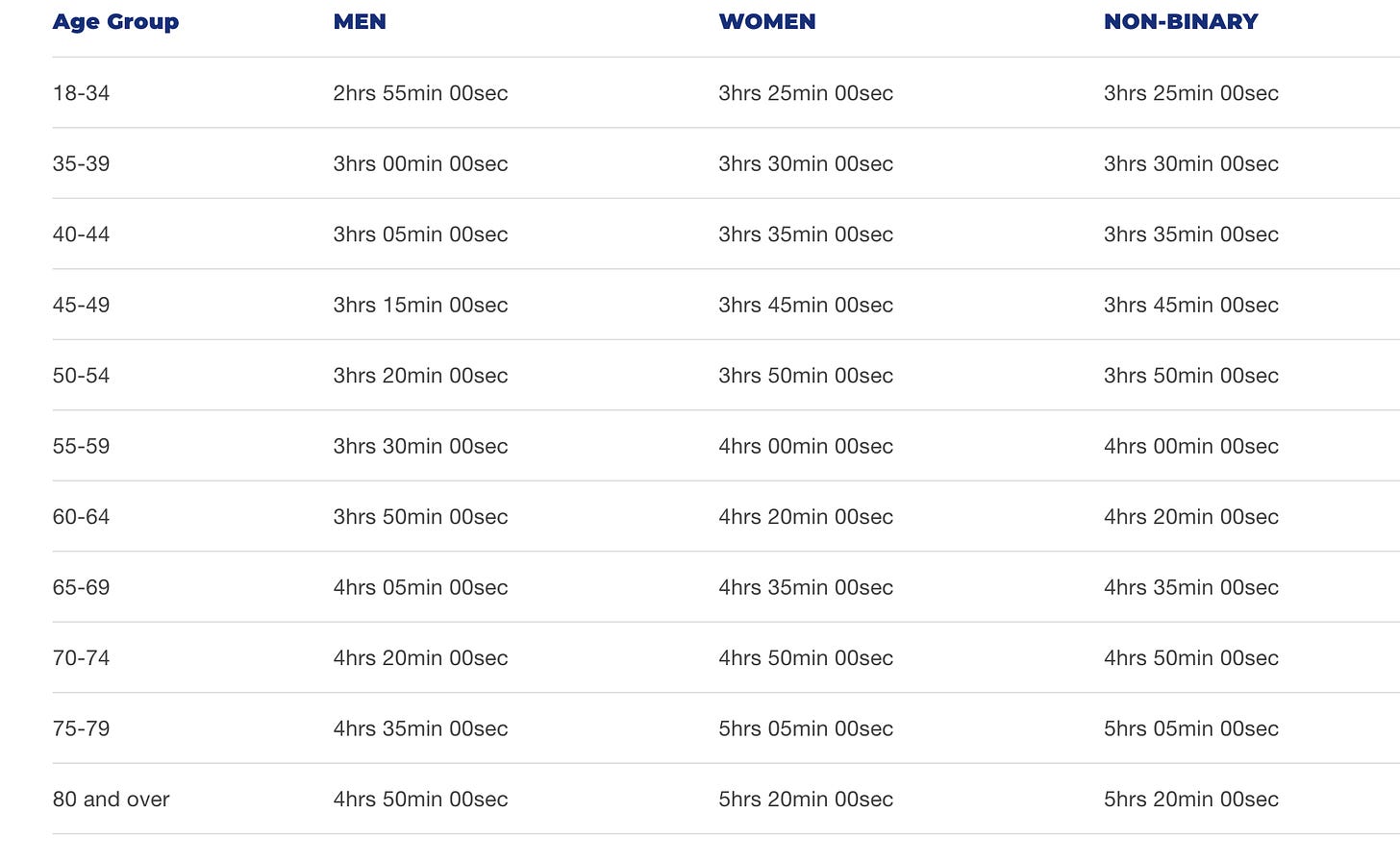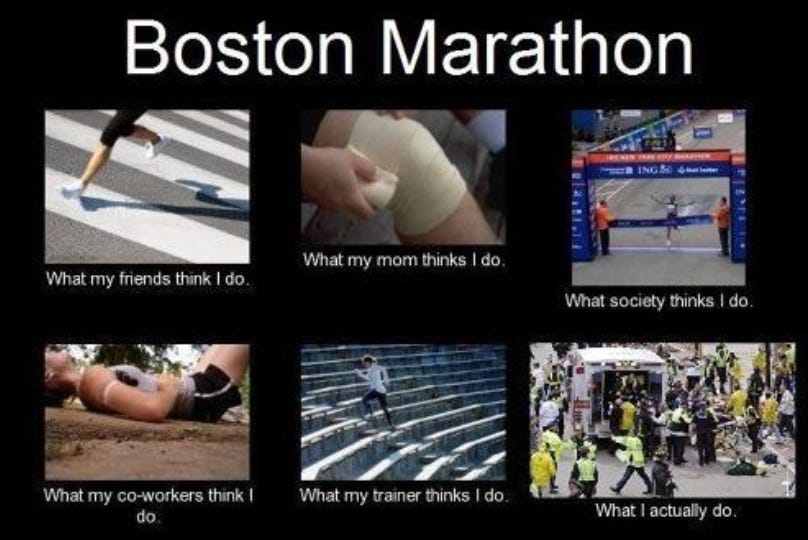Welcome,
Most people know, because it's all over social media, that the Boston Marathon has changed its qualifying time standards. This means that the times are now five minutes faster for all age groups.
The Boston Athletic Association (B.A.A.) recently announced updates for the 129th and 130th Boston Marathons. During the registration week for the 2025 event, a record-breaking 36,406 qualifier applications were received, surpassing the previous year’s 33,058 applicants.
While enthusiasm for the marathon continues to grow, not all qualifiers will be accepted due to field size limitations. Runners accepted will be told in early October.
Between the standard and the cutoff, it can get confusing who will actually get to race. In some recent years, there was no cutoff, and everyone who applied got to run. This was likely due to overseas travel bans during COVID when many people could not travel and therefore did not apply. Or less people applied because they were not ready to be in big crowds.
2026 Boston Marathon Qualifying Standard Adjustments
The B.A.A. has announced changes to the qualifying standards for the 2026 Boston Marathon, following an in-depth analysis of entry data. The qualifying times have been tightened by five minutes for athletes aged 18-59.
If this comes as a shock to you, you likely haven’t been paying close attention. The cutoff has been 5+ minutes faster than the standard in recent years.
Here are some random points I've seen circulating online this week:
The Argument Over Men’s vs. Women’s Standards
There is an ongoing debate that the men's standard is harder than the women's. I don't necessarily disagree with that, but I think it has to do with the bigger trends we see, like the rise of women in running. Quite frankly, more women are running and more women are realizing they can run fast.
Many women in their 30s are starting families, which can take years away from their training. Or give less time to run. Also, the Boston Marathon field is still over 60% men. If the women's standard were truly easier to obtain, we would see more women running the race. So, I personally believe that the times are appropriate.
What About Nonbinary Athletes?
Nonbinary athletes make up a small percentage of the Boston Marathon field, maybe around 50-100 participants. In 2024, there were 53 that entered. There’s always a lot of noise about how nonbinary athletes are ruining women’s sports (not my opinion, a topic for another day). Then there’s the complaint when nonbinary athletes have their own category. So, what exactly do you want? Personally, I'm happy to see more races giving nonbinary athletes their own category and prize money.
Should Downhill Races Be Boston Qualifiers?
Why are we still allowing these huge downhill races to count as Boston Qualifiers (BQs)? I think Revel races are well organized and fun—really, I do. Tunning down a mountain is challenging in its own way. I ran the Revel Big Bear Half Marathon in 2021, and I clocked just over 1:30—10 minutes faster than I was capable of at the time. Those 10 minutes didn’t even feel like hard work.
In my opinion, downhill marathons that drop 4,000+ feet can give you anywhere from 15 to 20 minutes back. That's not to say they aren't difficult—my quads were sore for days—but I don’t believe they should be BQ-eligible. I think the races that someone can use to qualify for the Olympic Trials (OTQ) and those for BQ should be held to the same standards.
Are Shoes Playing a Role in Faster Times?
Of course, they are. But it's not just because shoe technology is faster. People are recovering more quickly and running smarter. Personally, I have a love/hate relationship with super shoes. Due to my quirky running form, I’m just not a great "super shoe responder." But hey, it is what it is!
First-Time Qualifiers vs. Repeat Runners
I don't think it would be incredibly difficult to write a code that separates first-time Boston runners from those who have run multiple times. Then, perhaps, we could give first-time runners the ability to register first so more of them get accepted. Some people's peak performance might be one second below a BQ time, and they may never get to run because someone who has run Boston 10 times with a faster time registered before them.
Why hasn’t Boston figured out a way to allow more first-time runners? I’ve seen some elitist views calling this "participation trophy" mentality, but take a seat. It's not the prize-winning runners thinking this way; it’s the sub-elite runners who need to justify why they’re "so good" at running.
"Less" Charity Runners:
I'm not really going to touch on this too much. If you've never raised money for a charity, than you don't know how incredibly challenging it is. The argument that we should have fewer charity runners is wild to me.
Do I Have Any Interest in Running Boston?
Honestly, not really. It's an expensive, crowded weekend, and it just isn't my scene. Maybe one day—who knows?
Anyway, I’d love to hear your thoughts!
What is Keeping Me Entertained?
Ketone-IQ Review: This stuff has been all over my social media feed. I finally reviewed it.
Newton Momentum Running Shoe Review
Shannon Rowbury gets bronze medal 12 years after competing in London Olympics
Finally, thank you to everyone who has bought a subscription to the LOLZLetter. It does mean a lot in a world where you can subscribe to billions of things.




There was a brief window when I was 58 where I was well trained for a 4 hour marathon and I thought if I can improve on this a little bit I might be able to qualify at 3:55 when I hit 60. Alas, I'm not faster and the cutoff is. I think that dream has passed.
I have run Boston 12 times in the past 24 years. The first time (2001) I didn't even register until February for the race in April. The idea of running Boston has gotten extremely popular in the past 20 years. I think that the new BQ times make sense. There is nothing worse than thinking that you got a BQ time and then not getting in the race. And if you think that the BQ times are difficult now, there was a time that everyone had to run sub 2:50 to get in Boston. I do agree with you, though, that downhill races should not be acceptable BQ qualifying races.